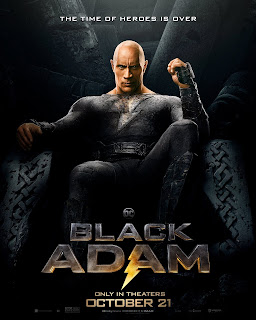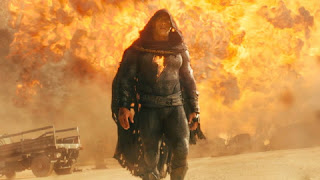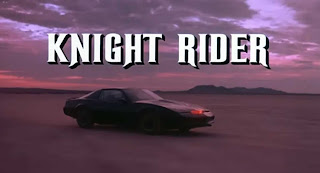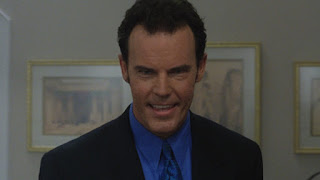In case you hadn't noticed, The Rock is not playing a good guy in Black Adam. That has seemed pretty clear from the start but for those who were still wondering, the tagline on Black Adam's latest poster is here to remove any doubt. Don't make the mistake of thinking this is a superhero movie, people, because "The Time of Heroes is Over." Everyone got that now? As much as I think Black Adam looks like a well mounted spectacle, and as much as I'm rooting for Warners/DC to get their shit together on the movie end, I feel like this tagline perfectly sums up why the direction of the DCEU is so utterly mismanaged. Saying that the Time of Heroes is over when it comes to the DCEU is such a laughable selling point. I mean, help me out here. If you want to say that the Time of Heroes is over, you've got to be able to tell me when the hell it started. I don't think I'm the only one who feels like they're still waiting on that.
I mean, according to the calendar, the current age of DC movies began in 2013 with Zack Snyder's Man of Steel. But that big relaunch, the movie that was supposed to reestablish Superman as a big screen powerhouse, the movie that was supposed to position DC to really take on Marvel in a big way, ended with Superman murdering his opponent. That this also followed the leveling of Metropolis as Superman and General Zod waged a careless battle that left everything in rubble around them only added to the sense that this was, on a fundamental, core level, a poorly judged take on Superman. This is your reboot of Superman, a movie that's supposed to be the starting point for not just more Superman but for an entire newly minted DC cinematic universe and this is how you want to go with it? Come on now. It's incredible to me that there was no one in the room to say "Wait, this is stupid. What the fuck are we doing?"
Obviously Man of Steel does have its fans but setting aside the technical skill involved in it and whether it is, in and of itself, an interesting interpretation of Superman, the bottom line is that it felt made by people who didn't fully buy into the character. It felt like a rejection of what some might call the inherent corniness of Superman. Coming off of Christopher Nolan's Dark Knight trilogy, it seems like the feeling from everyone involved in Man of Steel, including Nolan himself as producer and Dark Knight scripter David S. Goyer who wrote Man of Steel's screenplay after conceiving of the story with Nolan, believed that applying the darkness of Batman's world to Superman was the only viable way to make him work for a modern audience. If someone were to say that Superman is a character who has always seemed too good to be true, the makers of Man of Steel would no doubt be the first to say "we agree!" They didn't so much adapt Superman so much as they diminished him in order to make the character bear the burden of their own cynicism. There's no law against being a cynic but it's probably better that those people not be put in charge of adapting one of the most inspirational characters in fiction. Who knows, they might choose to do something dumb, like turn him into a killer.
Yes, it's true that Superman has killed in the comics before. Most notably, in issue #22 of Superman's mid '80s relaunch, Superman was compelled to execute the trio of Phantom Zone criminals by exposing them to green kryptonite. This was presented as an absolute last resort, though, and only after these remorseless sociopaths had murdered five billion people. Even then it was an extreme outlier event for Superman in course of, what at the time was just over five decades' worth of adventures and, importantly, there was the storytelling space afforded by comics to get into the emotional repercussions of it. A movie, on the other hand, is a whole different beast. Things hit in a whole different way on film and there isn't a ready opportunity to address the fallout of a shocking, out of character turn.
As filmmakers, when you know the story that you plan on telling and you know that the images you're creating to tell that story are all going to be projected on a giant screen, you should pause and ask yourself, even at the screenwriting stage: is Superman breaking a man's neck what we really want to put up there? For Superman to kill evil Kryptonians with kryptonite in the pages of a comic book is kind of grim, sure, but yet it still comfortably resides in the realm of fantasy. He's exposing them to kryptonite radiation, not breaking their necks or strangling them to death. As dark as Batman is, we've never seen him straight up murder someone in a movie. But thanks to Man of Steel, Superman's got blood on his hands. Yes, it's Kryptonian blood but still. I don't think you have to be a hopeless Pollyanna to recognize what a misstep that is. Some will say "But Superman didn't have a choice!" and to that I say, well, Superman didn't write the script. People did. They chose to put the character in a certain situation and then didn't want to work to show him being smart enough to think his way out of that moment without resorting to killing. Everyone involved with Man of Steel, all these fucking grown adults, should have had a moment before shooting even began when they stopped to ask themselves "Oh, for God's sake, what are we even trying to prove here with this edgy nonsense?" But they didn't. And what we got is what we got.
At least if there had been a Man of Steel 2 to follow up on the events of the first film and if it became clear that, yes, there was a plan to deal with this and that it was all part of a carefully laid out character arc, then ok. Fair enough. But that wasn't the case. Man of Steel, and the DCEU itself, is going to turn ten next year and we still haven't gotten a Man of Steel 2. At this point it's pretty clear that we never will. Instead we got more of Henry Cavill's Superman in BvS: Dawn of Justice, a movie where Batman is trying to kill Superman because the destruction Superman caused in Man of Steel convinced Bruce Wayne that Superman was a threat to humanity that needed to be put down. We could have gotten a World's Finest movie instead where Batman and Superman meet and become friends and allies but, um, I guess that never occurred to anyone at Warners. Superman was also seen again in the two different cuts of Justice League, only one of which (the lesser of the two) is actually canon to the DCEU and neither of which gives significant screentime to Superman, with him being (sigh) dead for most of the running times of both versions.
Point being, Superman has not been well served in the DCEU (that's not to fault Henry Cavill in any way, who did a fine job with what he had to work with) and the bottom line for me is if you can't figure out what to do with Superman, then you're never going to truly figure the rest of it. If you can't wrap your head around Superman, your vision of the DC universe is going to be forever lacking. He's the cornerstone to all of it. There have been some genuinely heroic DCEU highlights like Aquaman and Shazam! (many would also cite the first Wonder Woman but outside of the No Man's Land scene, I don't think the movie works very well) but as far as portraying the kind of shining age of heroes that a fully functioning DC cinematic universe ought to, things have not gone well.
They botched Superman, they botched the Justice League. And they dropped the ball hard on Wonder Woman in her second outing. What kind of "time of heroes" is that? A pretty shitty one, in my opinion. Out of the ten DCEU movies so far, three of them - the two Suicide Squad films and Birds of Prey - have already been about antiheroes. So how Black Adam is supposed to represent some kind of bold shakeup for the DCEU, I don't know. In the Black Adam trailer when Hawkman tells Black Adam that heroes don't kill and Black Adam shoots back with "Well I do!" how is this not a ridiculous exchange in a cinematic universe that started with Superman - Superman!! - killing someone?
I'm not saying that I'm not excited for Black Adam or that I think it won't be good. The thought of seeing Golden Age characters like Dr. Fate realized on screen is a cool prospect for this comic fan and Jaume Collet-Serra (Orphan, Jungle Cruise) is a very solid director so I actually have a lot of optimism towards it. If anything, I'd be surprised if it disappointed. I'm just saying it is genuinely confounding to see such a massive effort put into launching an antihero in the DCEU when they still have not gotten the hero part quite right.
It says a lot about the DCEU, and none of it good, that "The Time of Heroes is Over" would have fit just as well as a tagline on the posters for Man of Steel as it does on Black Adam's. Even better, I'd say. By rights, Man of Steel should have kicked off a new heroic age for the DC universe. It should have served as a full throated statement from Warners/DC that, hey, we have the real deal here. If you want to talk about superheroes, this is the definitive article and we're going to remind you why that is. Instead it felt made by people who were constantly scratching their heads, asking "Wait, why does anyone care about this guy?" If that actually wasn't the behind the scenes vibe on Man of Steel, you sure can't tell by the movie.
I don't begrudge Black Adam whatever success it might go on to have but it would just be nice if the movie actually represented the true change of pace for the DCEU that the studio seems to think it does rather than looking like business as usual.




















































